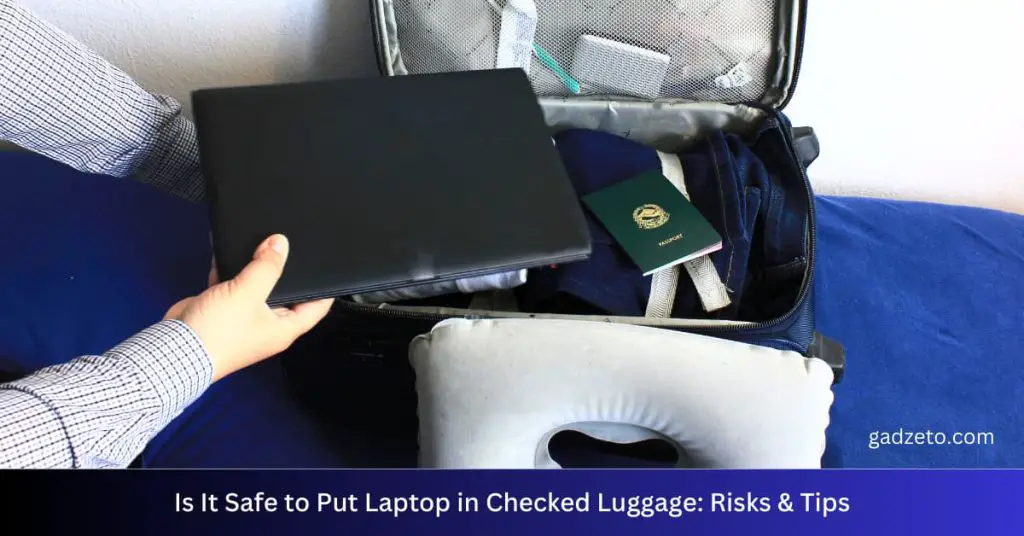It is not recommended to put a laptop in checked luggage due to potential damage, theft, or loss. Airlines often advise carrying electronics in your carry-on baggage.
Traveling with laptops requires mindfulness about their security and safety. Today’s travelers are more tech-savvy than ever, and laptops are a frequent companion on journeys, whether for business or leisure. The risks of checking in a laptop include exposure to extreme temperatures, rough handling, and the possibility of being misplaced during transport.
To mitigate these risks, the ideal approach is to keep your laptop with you in carry-on luggage. This ensures that you can keep an eye on it throughout the journey, reducing the chance of any harm coming to it. By following airline guidelines and exercising caution, passengers can protect their valuable electronics while traversing the globe.
Laptop Luggage Dilemmas: The Safety Question
Imagine arriving at your destination, only to find your laptop damaged or missing from your checked luggage. This nightmare scenario leads many travelers to ask: Is it safe to pack a laptop in checked luggage? Let’s dive into the concerns and airline policies that surround this issue.
The Concern With Checked Luggage
Checked luggage undergoes various risks during travel. These risks can lead to potential harm to electronics. Consider the following points:
- Rough handling could cause physical damage, such as broken screens or loose components.
- Exposure to temperature or pressure changes in the cargo hold can affect battery life and performance.
- There is always a risk of theft or loss. Airports see many bags, and valuables like laptops can be targeted.
Official Airline Policies On Electronics
Most airlines recommend keeping electronics in carry-on luggage. This advice stems from their policies:
| Airline | Recommended Baggage Type for Electronics | Liability for Checked Electronics |
|---|---|---|
| Example Airline A | Carry-on only | Limited or no liability |
| Example Airline B | Carry-on strongly advised | No coverage for damage or theft |
| Example Airline C | Permitted in checked luggage | Coverage up to a certain amount |
Each airline has its own policy, but the theme is clear: carry-on is safer for your laptop. You maintain control over your device, lessening the chance of damage or theft.
Risks Involved With Checking Your Laptop
Traveling with a laptop brings a question to mind: Is it safe to put it in checked luggage? Understanding the risks involved with checking your laptop is critical. Protect your device and data by being aware of potential problems.
Potential For Theft And Tampering
Your laptop might disappear from your suitcase. Airports are bustling places. Security might not catch a quick-handed thief. Clever individuals can also tamper with your device without leaving a trace.
- A lock helps, but isn’t foolproof.
- Thieves target electronics, knowing their value.
Damage Risks During Transit
Luggage handlers move fast and your laptop could suffer. Suitcases get tossed and turned en route. Without proper padding, your laptop may face serious damage like:
| Damage Type | Effect on Laptop |
|---|---|
| Cracks | Screen or casing breaks |
| Pressure | Internal components malfunction |
| Moisture | Electronics short-circuit |
Data Security And Privacy Concerns
Your personal info is at risk if your laptop is out of sight. During transit, privacy breaches can occur. Ensure your data is secure by taking steps beforehand:
- Use strong passwords.
- Encrypt sensitive files.
- Back up important data.
Weighing Convenience Against Risk
Traveling by air often means making strategic decisions about luggage. When flying, you might wonder if it’s safe to put your laptop in checked baggage. Let’s break down the dilemma of convenience against the potential risk to help make an informed choice.
Assessing The Need To Check Your Laptop
Travelers often face a common question: Should my laptop travel with me in the cabin or go in checked luggage? Think about these factors:
- Theft: Checked bags can become targets for theft.
- Damage: Rough handling could damage electronics.
- Lost Luggage: Airlines sometimes misplace baggage.
Considering these risks, evaluate your laptop’s necessity. Is it required for work during the flight? Can it stay home? Is it fully insured? Answers guide your decision.
Alternative Options For Traveling With Electronics
If checking your laptop seems risky, look at these alternatives:
| Solution | Benefits |
|---|---|
| Cabin Baggage | Safe under your watch during the flight |
| Security Sleeves | Added protection against impacts |
| Data Backup | Keep your information secure, whatever happens |
Each method secures your device against common travel woes. Keep ease and protection in mind, and smile knowing your electronics are snug and safe.
Protective Measures For Your Laptop
Traveling with a laptop requires extra care. Protect your device with smart measures. Laptops face risks like damage, theft, and loss in checked luggage. Apply these steps for a safe journey.
Choosing The Right Laptop Case
A sturdy laptop case is a must. It shields against impacts and pressure. Cases made from hard materials offer the best protection. They absorb shocks from rough handling. Here’s what to look for:
- Durable outer shell – Hard cases resist crushing.
- Soft inner lining – Padding reduces scratches and absorbs shocks.
- Tight fit – A snug case prevents your laptop from moving.
- Water resistance – It protects against spills and weather.
Using Tracking And Security Features
Laptops often contain sensitive data. Keep your data and device safe. Use built-in security. Turn on tracking software in case of loss. Consider these options:
| Security Feature | Description |
|---|---|
| Tracking software | Locates your laptop if lost or stolen. |
| Biometric locks | Uses fingerprints to prevent unauthorized access. |
| Data encryption | Protects your files from hackers. |
- Set a strong password to prevent unauthorized logins.
- Activate ‘Find My Device’ features for easy tracking.
Insuring Your Electronics
Travel insurance is crucial. It covers loss, theft, or damage. Policies differ, so pick one that suits your needs. Look for:
- Comprehensive coverage that includes electronics.
- Reasonable deductibles, ensuring claims are affordable.
- Quick claim processing, for fast reimbursement.
Keep receipts and serial numbers. They help in making claims. Most policies require proof of ownership.
Packing Tips For Laptops In Checked Luggage
Traveling with your laptop requires care, especially when it has to go in checked luggage. Follow these packing tips to keep your electronic buddy safe throughout the journey.
Proper Laptop Placement Inside The Suitcase
Choose the middle layer of your suitcase. This spot shields your laptop from sudden impacts. Make sure the device lies flat and isn’t at an angle. This avoids pressure on the hinges.
Using Cushioning Materials
- Pack with soft clothing or foam. Surround your laptop with these materials to act as a buffer.
- Invest in a padded sleeve. This extra layer absorbs shocks and protects against scratches.
- Consider bubble wrap. For additional protection, wrap your laptop in bubble wrap before placing it in the suitcase.
Sealing And Labeling Your Luggage
Seal your suitcase with TSA-approved locks. This secures your valuables from theft and tampering.
Label your luggage clearly. Attach a tag with your name and contact information. This way, if your luggage gets lost, the finder can contact you.
Final Thoughts: Best Practices For Flying With Laptops
Traveling with laptops requires careful consideration. For optimal security and peace of mind, keep a few key practices in mind. Your device’s safety matters. Embrace the tips shared to ensure a smooth journey.
Summary Of Tips For Safe Transport
- Use a laptop sleeve: A padded sleeve safeguards against shocks.
- Backup data: Always have your data backed up before flying.
- Encrypt sensitive information: Protect your files with encryption.
- Lock your device: Secure with a strong password.
- Label your laptop: Attach contact info in case of loss.
- Keep it charged: A charged laptop can be inspected easily.
- Check airline policies: Each airline has unique rules. Know them.
When To Opt For Carry-on Instead
Laptops in checked luggage face risks: theft, damage, or loss. Opt for carry-on when:
| Carry-On Reason | Why It Matters |
|---|---|
| High-Value Device | Expensive or important laptops stay safest with you. |
| Privacy Concerns | Prevent unauthorized access during transit. |
| Vibrations and Temperature | Cargo holds may have extreme conditions affecting electronics. |
| Immediate Access | Work or entertainment on demand. |
Frequently Asked Questions Of Is It Safe To Put Laptop In Checked Luggage
What Electronics Are Not Allowed In Checked Luggage?
Electronic devices with lithium batteries, such as power banks and e-cigarettes, must not be packed in checked luggage. Secure spare batteries in your carry-on.
Can I Put Laptop In Checked Baggage Delta?
Yes, you can place your laptop in checked baggage on Delta flights, but it’s advisable to carry it onboard to avoid damage.
Do Laptops Go In Hand Luggage Or Suitcase?
Laptops should be placed in hand luggage during air travel. This ensures easy access for security checks and protects the device from potential damage in checked baggage.
Can Tsa Check Your Laptop?
Yes, the Transportation Security Administration (TSA) can check your laptop. TSA agents routinely scan or manually inspect laptops during security screenings at airports. Always follow their instructions for efficient checks.
Conclusion
Travelers often face the dilemma of securing their electronics while flying. To end the suspense: it’s risky to check your laptop. Always prioritize its safety by keeping it in your carry-on. For peace of mind, avoid the hold; keep your device at hand during your journey.
Safe travels and smart packing!






